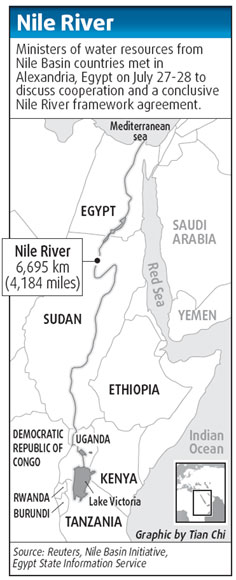No deal in sight on Nile sharing
CAIRO: Ministers from the nine African countries on the Nile River agreed late on Tuesday to delay the drafting of a new water sharing agreement for six months.
The process has been hampered by Egypt's refusal to reduce its share of the world's longest river. The ministers formed committees to review points of contention and planned to reconvene in January, the official Middle East News Agency reported.
|
||||

Water Minister Mohamed Nasreddin Allam of Egypt said it did not matter if other Nile Basin countries were not convinced of the rights given to Egypt, the most populous Arab country with almost 77 milion people and little rainfall, in previous agreements.
"It doesn't matter if they are convinced. It matters that we are convinced," Allam told reporters at the 17th meeting of water ministers of the Nile Basin Initiative, formed in 1999 to promote co-opreation and food security.
With agriculture accounting for 83.3 percent of Egypt's water consumption in the fiscal year 2007-08, securing water is vital for the country's food security. Egypt has been cutting down on water-consuming crops such as rice, an Egyptian export, in order to save water.
Participants in the two-day meeting in the Mediterranean port city of Alexandria had been hoping to establish a permanent body to oversee water allocation.
"The ministers decided to continue negotiating for the next six months, with the aim of ironing out the points of disagreements through technical committees ... to reach a unified agreement between all the countries of the Nile basin," said Allam.
A 1929 agreement between Egypt and Britain, acting on behalf of its then east African colonies, set up the original sharing framework and gave Cairo the right to veto upstream projects. Another agreement 30 years later between Egypt and Sudan gave Cairo an annual 55.5 billion cubic meters of Nile water.
That share is resented by other countries such as Rwanda, Kenya, Uganda, Tanzania, the Democratic Republic of Congo, and Burundi. These countries had planned to sign a separate water sharing agreement because of Egypt's intransigence, but agreed to delay the effort following Sudanese mediation.
Sudanese Irrigation Minister Kamal Ali told Sudan's official news agency that the technical teams hope to reach an agreement by January.
Due to the absence of any major dams or hydroelectric projects upstream of it, experts say Egypt can afford to be dismissive of the other states' concerns since there is little they can do to impede the Nile's flow.
AP - Reuters
























